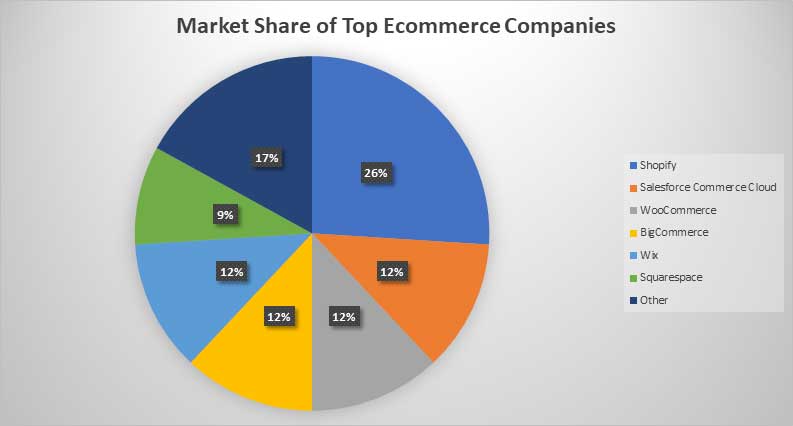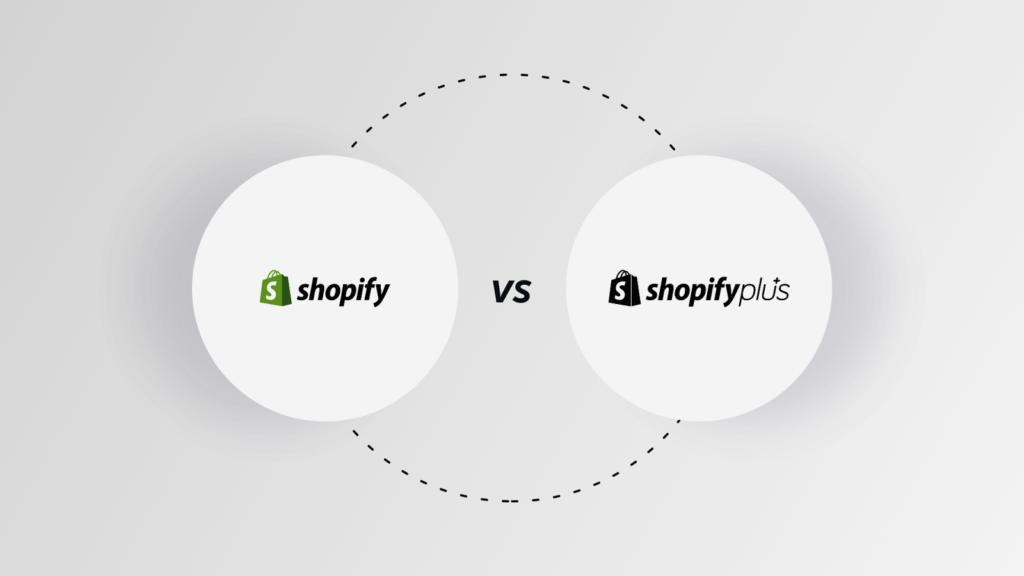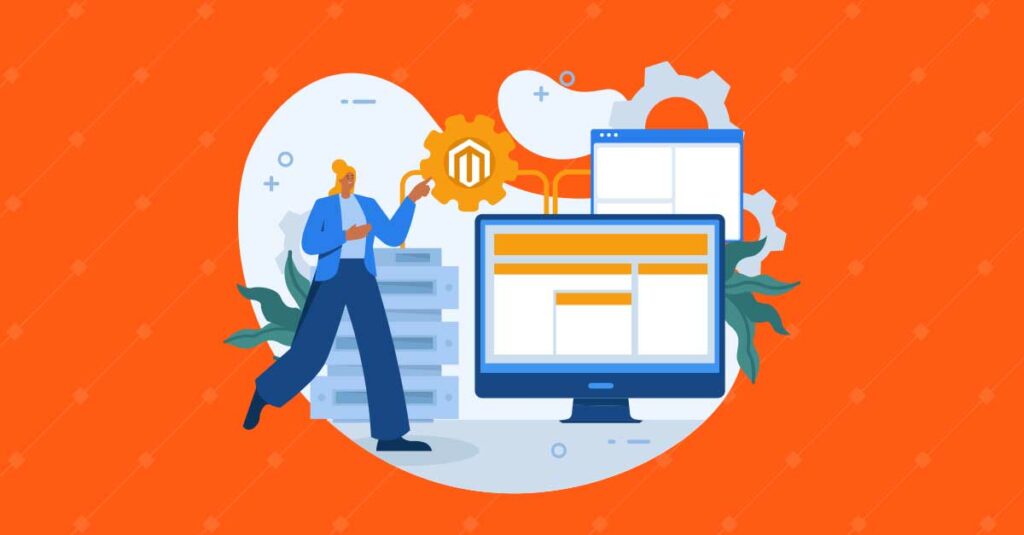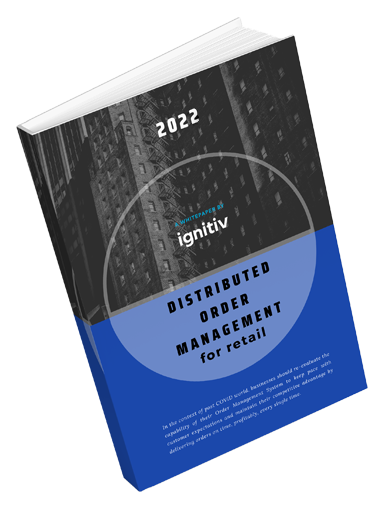Enterprise Ecommerce Solutions
Today’s business landscape is highly dynamic with new trends emerging every day. Keeping up with the demands of your customers and market requires constant innovation and a willingness to take risks.
Ecommerce is one of the fastest-growing segments in today’s business environment, and for good reason: It’s proven to be a great way for B2B, B2C, or D2C businesses to reach new customers, increase revenue, and drive sales. That being said, ecommerce isn’t the right fit for all businesses. Depending on your company’s needs and challenges, different enterprise ecommerce solutions are available to meet them head-on.
Whether you are just starting an ecommerce business or looking to launch a new campaign that will take your brand to the next level, this article covers everything you need to know about enterprise ecommerce platforms. It will help you consider the one that suits your need and budget.
What is an Enterprise Ecommerce Solution?
An enterprise ecommerce solution is a software platform that provides full-fledged ecommerce capabilities to large organizations. Enterprise software allows you to build, manage, and grow your online store in a single integrated platform, which can be accessed by your employees and partners.
In other words, it is software that enables you to sell products online from a single web platform. This can come in the form of an out-of-the-box ecommerce website template, a fully-hosted ecommerce website, or a SaaS (Software-as-a-Service) ecommerce software that lets you build and manage your ecommerce website from a single platform. It allows you to set up your company’s online store from scratch, manage your inventory, run promotions, process payments, and more. There are a variety of Ecommerce Enterprise Solutions tailored to meet the specific needs and overcome the unique challenges of your business, which can assist you in accomplishing your ecommerce objectives.
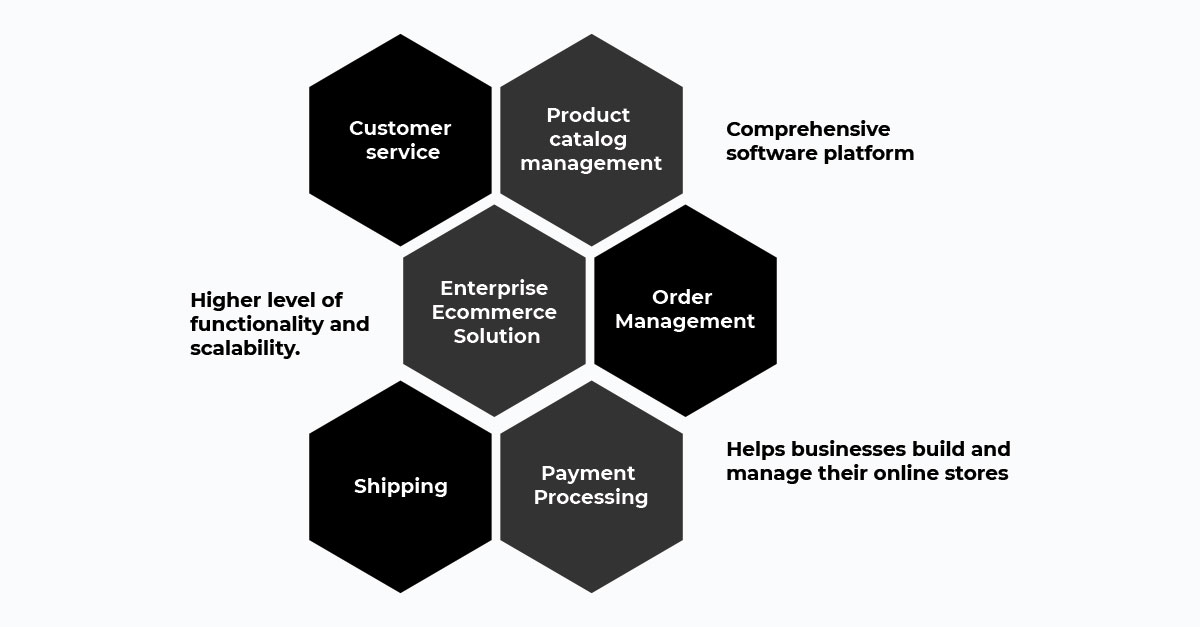
Enterprise ecommerce solutions are designed for medium to large-size B2B, B2C, or D2C businesses that need more than just an ecommerce website builder to grow their online sales. They come with advanced functionality and pre-built extensions that can be easily customized to meet your unique B2B, B2C, or D2C business needs.
Enterprise Ecommerce Platforms
On-Site
The benefits of on-site enterprise eCommerce systems are many and varied. Perhaps the most obvious benefit is that these ecommerce solutions for enterprises allow B2B, B2C, or D2C businesses to conduct their entire ecommerce operations from a single, centralized location. This can save businesses a considerable amount of time and money, as they won’t have to maintain separate ecommerce infrastructures for each of their locations.
Another major benefit of on-site enterprise ecommerce solutions is that they offer B2B, B2C, or D2C businesses a high degree of control over their ecommerce operations. With an on-site solution, businesses can customize their ecommerce platforms to fit their specific needs and requirements. This customization can include everything from the overall look and feel of the platform to the functionality that is included.
On-site Enterprise Ecommerce Platforms can also provide businesses with several other benefits, such as the ability to scale their operations as needed. This scalability can be particularly helpful for businesses that experience seasonal spikes in their ecommerce activity. With an on-site solution, businesses can simply add more servers or storage capacity as needed to accommodate the increased traffic.
Finally, on-site Enterprise Ecommerce Software can offer businesses several advantages when it comes to security. With an on-site solution, businesses can physically secure
An on-site enterprise ecommerce solution is a type of ecommerce platform that is installed and hosted on a company’s servers. This type of solution is usually chosen by larger businesses that have the resources to maintain their own IT infrastructure.
Cloud-Based
Cloud-based SaaS solutions are platforms that allow businesses to sell online using the cloud. These solutions are typically hosted by a third-party provider and offer a variety of features, such as shopping cart functionality, order management, and payment processing. As the world increasingly moves to the cloud, businesses are looking for cloud-based solutions for enterprise ecommerce that can provide them with the scalability, flexibility, and security they need to grow and succeed.
Some of the best Enterprise Ecommerce Platforms are cloud based ecommerce solutions that enable businesses to sell products and services online efficiently at scale. For Example below is a list of the top cloud-based enterprise ecommerce solutions.
Shopify Plus
Shopify Plus is a cloud-based enterprise custom eCommerce software that offers businesses of all sizes the ability to create an online store. It’s easy to use, scalable, and secure, making it a great option for businesses that are looking to grow their online presence.
BigCommerce Enterprise
BigCommerce Enterprise is another cloud-based best ecommerce platform for a large business to create a custom online store. It’s scalable and secure and offers several features that businesses can use to grow their online presence.
Magento Commerce
Magento Commerce is a cloud-based enterprise ecommerce solution that offers businesses the ability to create a custom online store. It’s scalable, flexible, and secure, making
Open-Source Cloud-Based
These are ecommerce platforms that are open-source, cloud-based, and designed for enterprises. These platforms offer a variety of features and benefits that can help businesses grow and succeed online. Open-source platforms are typically more customizable and offer a wider range of features than proprietary platforms. Cloud-based platforms offer scalability and flexibility, allowing businesses to grow and expand their online presence without the need for expensive infrastructure. Enterprise-grade e-commerce solutions are designed to meet the needs of larger businesses, offering a comprehensive set of features and tools to help businesses manage their online sales and operations.
Headless commerce
Headless E-commerce platforms & eCommerce Solutions are those that allow businesses to manage their online stores without the need for a central head or management system. This type of solution is often used by businesses that have multiple online stores, or that sell products through multiple channels. Headless commerce solutions can be used to manage inventory, process orders, and track customer data.
Headless commerce is a type of ecommerce solution that decouples the front-end user interface from the back-end systems that power the site. This allows businesses to build custom, interactive experiences for their customers without having to worry about the underlying infrastructure.
Headless commerce can be used to power any type of online experience, from simple product catalogs to complex, personalized shopping journeys. It is particularly well suited for businesses that want to build unique, branded experiences for their customers.
Few among many benefits of headless commerce are listed below:
- Flexibility: Headless commerce gives businesses the ability to build custom experiences without being constrained by the underlying infrastructure.
- Agility: Headless commerce solutions are typically much easier to implement and scale than traditional ecommerce platforms.
- Improved customer experience: By decoupling the front end from the back end, businesses can create richer, more personalized experiences for their customers.
There are a few potential downsides to headless commerce as well:
- The need for more tech-savvy employees: This can be seen as a benefit or a drawback, but it requires more tech-savvy employees to manage a headless commerce site. You’ll need a developer to build and maintain the site, as well as someone to manage the content, and someone to manage the back-end eCommerce platform.
- Increased complexity: Headless commerce can be more complex than a traditional eCommerce site, as there are more moving parts. So maintaining it may be difficult and painful.
- Higher costs: It can be more expensive than traditional eCommerce, as it requires more technical expertise.
Enterprise Ecommerce Solution
What is the difference between Headless commerce and Omnichannel commerce?
Omnichannel commerce is a type of commerce that allows customers to purchase products and services through multiple channels, such as online, in-store, or through a mobile app. Headless commerce is a type of commerce that separates the front end of a website from the back-end eCommerce platform.
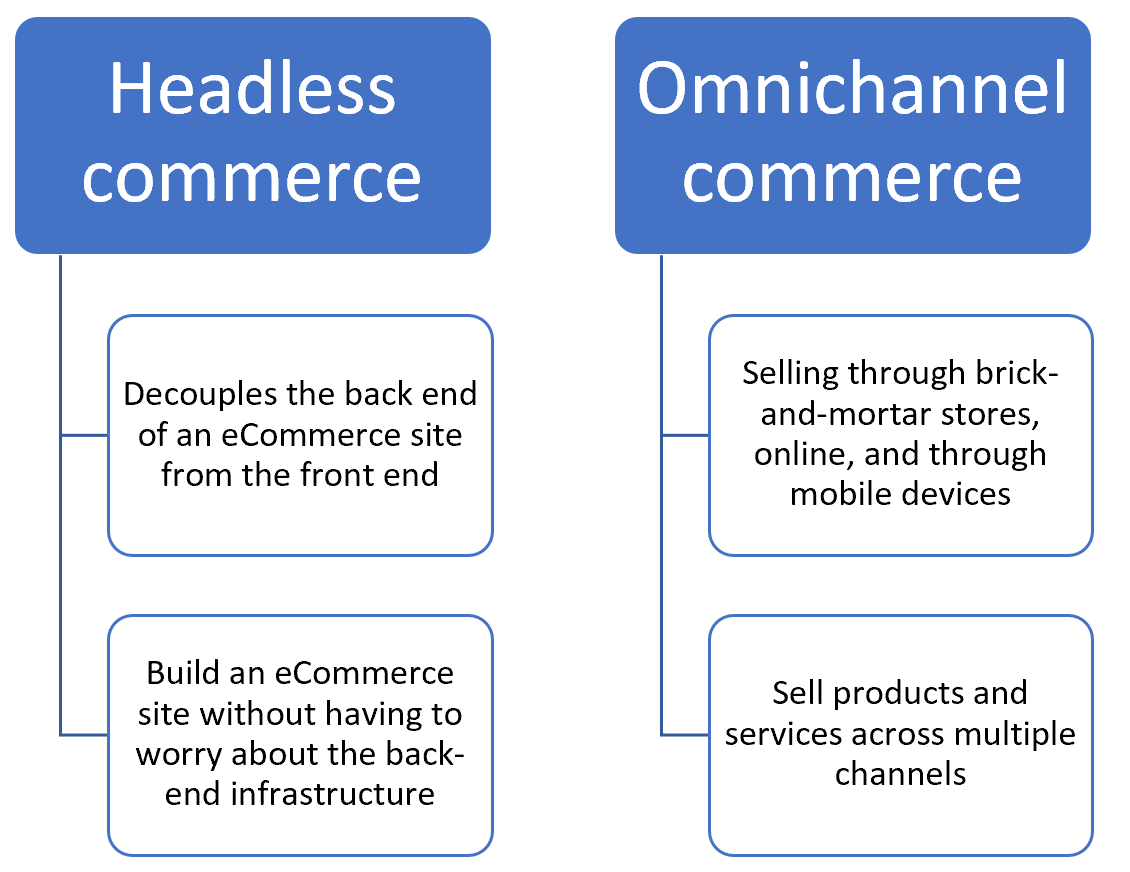
Omnichannel commerce is focused on providing a seamless experience for customers, regardless of the channel they are using. Headless commerce is focused on providing a flexible and scalable platform for businesses.
How to Choose an Enterprise Ecommerce Platform for Your Business
Choosing the right enterprise ecommerce solution can be tricky. It’s a big investment that requires careful planning, long-term commitment, and a willingness to try new things. Before you dive into the enterprise ecommerce platform comparison, it’s important to understand your company’s unique needs and challenges that you are looking to overcome by choosing the best enterprise ecommerce platforms.
For example:
- Are you looking to increase online sales?
- Do you want to improve customer experience?
What Problems Do You Have Now?
If you’re making the switch from another ecommerce platform, you’ll probably have a few things you’re unhappy about.
- Maybe you don’t like the design or the way your categories are set up.
- Maybe you’re not getting enough traffic, or you’re not happy with the way your shipping is set up.
Whatever the case may be, it’s important to identify your problems so that you can find a platform that will help you fix them.
What Do You Like About Your Current Platform?
There may be some things you like about your current ecommerce platform. Maybe you love the way your products are organized, or you love the color scheme. Whatever the case may be, it’s important to make a list of the things you like so that you can find a platform that has those same features.
What Features Do You Need?
Once you know what you don’t like about your current platform and what you do like, you can start to focus on the features you need. Maybe you need a platform that’s easier to use or one that has more customization options. Whatever the case may be, it’s important to make a list of the features you need so that you can find a platform that has them get fulfilled.
What to Consider in a New System?
Once you have a clear understanding of your needs, you can then start your enterprise ecommerce platform comparison by focusing on the following key criteria:
- Cost: Enterprise ecommerce solutions come at a cost. However, this shouldn’t be the only metric you consider when comparing them. A comprehensive e commerce solution that meets your needs and drives sales is worth the investment.
- Customer Satisfaction: Customer satisfaction is one of the most important metrics in ecommerce. Your enterprise ecommerce solution should help you improve the customer experience from the moment they land on your website until the moment they make a purchase.
- Performance: When considering the best enterprise ecommerce platform for your business, performance should be one of your key parameters. A platform that is not performant will likely lead to a poor user experience, which can hurt your brand and reputation. The business may observe a loss of sales and customers by its implementation. Therefore, it is important to choose a platform that can handle a large volume of traffic and transactions without any issues.
- Security: The security of an enterprise ecommerce platform is a major consideration for any business. To ensure the safety of your customer’s data and your own company’s data, you must choose a platform that offers a high level of security. This includes features such as data encryption, secure login, and fraud detection.
- Mobile: While choosing the right enterprise ecommerce platform, one of the parameters that affect the decision is how mobile the platform is. In other words, does the platform allow for a good mobile shopping experience? This is important because more and more shoppers are using their mobile devices to shop online.
- SEO and Website Builder: There are many factors to consider when choosing an enterprise ecommerce platform, but two of the most important factors are SEO and website builder. Here’s why:
- SEO: An enterprise ecommerce platform that is not optimized for search engines will be very difficult to rank highly in search results. This will make it difficult for potential customers to find your website, and will ultimately hurt your sales.
- Website Builder: A good website builder will make it easy for you to create a professional-looking website, even if you don’t have any experience with web design. This is important because your website will be the first impression that potential customers have of your business.
- Support for Multi-Channel Sales: An enterprise ecommerce platform that supports multi-channel sales can help businesses reach a wider audience and boost sales. Multi-channel selling platforms offer businesses the ability to sell through multiple channels, such as online, in-store, or through mobile apps. This can help businesses expand its horizon to boost sales and revenue.
- Scalability: Once you set up your ecommerce website, it will be there for years to come. That’s why it’s important to choose an enterprise ecommerce solution that will scale with your business as you grow.
- Supported Integrations: An enterprise ecommerce solution that offers a wide range of integrations can help you integrate your online store with other business systems, such as marketing automation software or customer service software. Enterprise Ecommerce CRM Integration helps you automate your business and improve productivity.
- Other Considerations: When choosing an enterprise ecommerce solution, you should also consider factors such as total cost of ownership, ease of use, and extensibility.
Best Enterprise Ecommerce Platforms to Choose From
Adobe Commerce (Formerly Magento)
If you are looking for a powerful enterprise ecommerce platform with robust functionality, then Adobe commerce cloud is an excellent choice. This open-source ecommerce solution is designed for high-volume and high-growth ecommerce businesses and has a proven track record — more than 500,000 online retailers, including FedEx, Toyota, and Budweiser, use it to drive their online sales.
With a wide range of enterprise ecommerce features, Adobe Magento Commerce offers a robust ecommerce experience for both retailers and their customers. It comes with a highly customizable ecommerce website design, which allows you to brand your storefront and integrate it with your company’s systems. Adobe Commerce Agency is a great choice if you want to run a robust and scalable enterprise ecommerce solution. It comes with built-in scalability and security, which allows you to easily add new features and run your ecommerce store on a single platform.
Let’s have a look on what ecommerce platform do big companies use?
(Statistics source: https://www.trustradius.com/vendor-blog/ecommerce-statistics-and-trends)
BigCommerce
BigCommerce is the leading cloud-based ecommerce solution for retailers of all sizes and industries. It’s an excellent choice if you want to launch a new ecommerce website from scratch or are looking for a new ecommerce platform to migrate to. This enterprise ecommerce platform offers a wide range of functionality, including inventory management, promotional and marketing tools, and payment integrations.
BigCommerce Enterprise
BigCommerce Enterprise is also highly scalable and can be easily integrated with your existing systems, which makes it a great choice if you are looking for an open-source ecommerce solution. If you are looking for an enterprise ecommerce platform that offers top-notch customer service and a broad range of customizations, then BigCommerce Headless Commerce is worth considering. It’s a cloud-based ecommerce solution that comes with an easy-to-use online store builder and a wide range of integrations that can be easily customized to meet your needs.
Shopify
If you are looking for an ecommerce platform that is easy to use and gets your online store up and running quickly, then Shopify is a great choice. This SaaS ecommerce solution is designed for small to medium-sized B2B commerce solutions and comes with a wide range of features that can be easily customized to meet your needs.
Shopify Plus is a great choice if you are looking for an enterprise ecommerce solution that offers top-notch customer service and a robust set of integrations that can be easily customized to meet your needs. It’s an excellent Shopify plus ecommerce agency for retailers who want to focus on growing their online sales and improving customer experience.
Salesforce Commerce Cloud:
It is a cloud-based ecommerce platform that offers businesses to create engaging online shopping experiences for their customers. The platform has a complete set of tools and features for building, managing and optimizing online stores, including a powerful drag-and-drop
website builder, a robust catalog management system, a sophisticated order management system, and a powerful marketing and analytics engine.
Summing Up
Choosing the right enterprise ecommerce solution is crucial to your company’s success. With a robust ecommerce platform, you can easily set up your online store, manage your inventory, and scale your B2B Ecommerce to new heights. That being said, Enterprise ecommerce solutions aren’t right for every B2B (Business-to-Business), B2C (Business-to-Consumer), B2B2C (Business-to-Business-to-Consumer), and D2C (Direct-to-Consumer). You should carefully consider your company’s unique needs and challenges and choose the platform that best meets them. Integrated Ecommerce Solutions allow you to manage your online store, inventory, fulfillment, marketing, and more from a unified platform. When you do, you can be sure that your SaaS ecommerce platforms will drive your sales and help you meet your business goals.
Are you confused which platform to choose for your ecommerce business?
Here are some factors you should consider before you decide.
- What is your budget?
- How much time and resources do you have?
- What is your level of technical expertise?
- What kind of products are you selling?
- What are your long-term goals?
If you need enterprise ecommerce solutions that are tailored to your specific business needs, contact us today. We have a team of experienced ecommerce experts who can help you select the right platform, set up your store, and start selling online.

